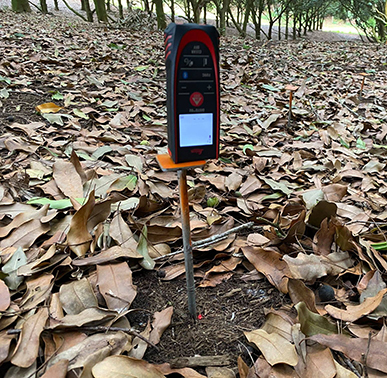
Wet summer provides ideal conditions for macadamia erosion research
1 March 2021

In stark contrast to this time last year, it’s been a very wet summer for macadamia researchers on the NSW north coast.
At our Clean Coastal Catchments (CCC) research site at Brooklet on the Alstonville plateau, a total of 338 mm of rain was recorded over a period of just four days in December 2020, followed by more wet weather in January and February 2021.
Soil erosion is a significant concern in this region due to the erosive red ferrosol soil, the frequency of high intensity rainfall, and the low percentage of groundcover.
In many macadamia orchards it is too dark underneath the tree canopy to maintain grass cover, so our researchers are investigating alternative options for soil protection.
Soil Scientist, Justine Cox, reports growers using best practice techniques such as covering their soil with mulch, or pruning their trees to let in more sunlight and promote grass growth, have reaped the benefits during the 'wet season'.
Our CCC trials to reduce soil erosion and retain nutrients in macadamia orchards were established in March last year . Compost, mulch, erosion sox, and prunings from on site limb removal, are being assessed for their capacity to withstand a range of erosive forces in this high intensity rainfall region.
Following soil sampling during March that will identify changes in soil fertility and health over the previous twelve months, Justine will start work on compiling a research update for growers and our Fertiliser Stewardship Group network.
Biochar and compost soil amendments in horticultural production
Justine Cox has also been evaluating biochars and composts over the last ten years in a range of horticultural crops and soils.
Justine recently presented a webinar for the NSW DPI Soil Network of Knowledge (SNOK) group, looking at the physical, chemical and biological changes in soil resulting from biochar and compost amendments, and the impacts on crop yield and quality.

